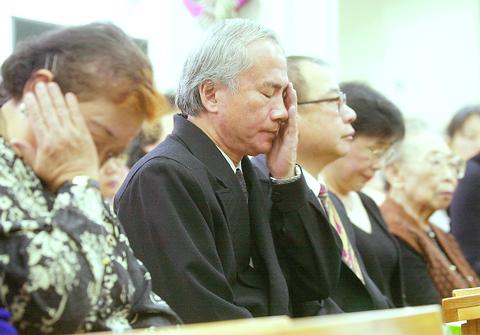Former DPP chairman Lin I-hsiung (
The site, where the Yi-Kwang Presbyterian Church now stands, is where his six-year-old twin daughters and 60-year-old mother were murdered on Feb. 28, 1980.
Lin yesterday returned to the site on Hsin-yi Road with friends and church leaders who had gathered with him to commemorate the day.

PHOTO: CHIANG YING-YING, TAIPEI TIMES
"It has been 22 years. I want to express my gratitude for those who have showed concern for us. Without the support from [these friends] we probably could not have continued on this path," Lin said.
Many of those attending the commemoration ceremony cried during Lin's speech.
To return his friends' love, Lin said, he had constantly encouraged his wife and his surviving daughter to lead meaningful and useful lives.
"I have tried very hard to carry on," he said. "To be one's own master and to control one's own destiny are the eternal desires of human beings, and democracy is the most significant system to help us realize this desire."
Under the sponsorship of the Chilin Foundation (
The museum exhibits documents, photos, newspapers, pamphlets, posters and T-shirts related to democracy movements.
Lin said the museum's aim is to generate determination among Taiwanese to consolidate the development of democracy.
Taiwan's history of democratic development has shown that the promotion of democracy is constantly challenged by relentless obstacles, according to Lin, and each conflict and effort to intimidate puts the existence of democracy in peril.
"Only by adhering firmly to democratic beliefs and resolving internal discord through democratic measures can crises be defused," he said.
Lin knows the cost of championing democracy all too well.
His daughters Liang-chun (亮均) and Ting-chun (亭均) and his mother Lin Yu Ah-mei (林游阿妹) were killed by a man, dressed in black, who broke into Lin's home while both Lin and his wife were away.
Lin was in jail -- he had been arrested on Dec. 13, 1979, for participating in a human-rights rally in Kaohsiung three days earlier. His wife, Fang Su-min (方素敏), was attending the public hearing into what was by then already called the Kaohsiung Incident (美麗島事件).
Lin's eldest daughter, Huan-chun (
The murderer has never been apprehended. However, Lin and many Taiwanese believe that the killings were politically motivated.
The murders -- on the anniversary of the 228 Incident (二二八事件), in which Taiwanese rebelling against KMT rule in 1947 were massacred -- rocked the nation.
The twins and their grandmother were not buried until Lin was released from jail in 1985.
After the murders, Fang and Huan-chun moved to the US to start a new life. Fang returned to Taiwan and ran in the 1983 Legislative Yuan elections in memory of the twins and Lin's mother.
"I don't know if [the murderer] is still alive now," Fang once said.
"But I don't hate him, because love is our best weapon."
Lin is revered by many Tai-wanese for transforming his personal sorrow into strength to struggle for the country's democracy.
The DPP came into power under his leadership, ending the KMT's five-decade-long rule after Chen Shui-bian (
Lin now spends much of his time running the Tzulin Cultural and Education Foundation, a pro-Taiwan political and environmental pressure group.
Huan-chun still lives in the US. She married an American in 1998 and her second child was born four days ago.

An essay competition jointly organized by a local writing society and a publisher affiliated with the Chinese Communist Party (CCP) might have contravened the Act Governing Relations Between the People of the Taiwan Area and the Mainland Area (臺灣地區與大陸地區人民關係條例), the Mainland Affairs Council (MAC) said on Thursday. “In this case, the partner organization is clearly an agency under the CCP’s Fujian Provincial Committee,” MAC Deputy Minister and spokesperson Liang Wen-chieh (梁文傑) said at a news briefing in Taipei. “It also involves bringing Taiwanese students to China with all-expenses-paid arrangements to attend award ceremonies and camps,” Liang said. Those two “characteristics” are typically sufficient

A magnitude 5.9 earthquake that struck about 33km off the coast of Hualien City was the "main shock" in a series of quakes in the area, with aftershocks expected over the next three days, the Central Weather Administration (CWA) said yesterday. Prior to the magnitude 5.9 quake shaking most of Taiwan at 6:53pm yesterday, six other earthquakes stronger than a magnitude of 4, starting with a magnitude 5.5 quake at 6:09pm, occurred in the area. CWA Seismological Center Director Wu Chien-fu (吳健富) confirmed that the quakes were all part of the same series and that the magnitude 5.5 temblor was

The brilliant blue waters, thick foliage and bucolic atmosphere on this seemingly idyllic archipelago deep in the Pacific Ocean belie the key role it now plays in a titanic geopolitical struggle. Palau is again on the front line as China, and the US and its allies prepare their forces in an intensifying contest for control over the Asia-Pacific region. The democratic nation of just 17,000 people hosts US-controlled airstrips and soon-to-be-completed radar installations that the US military describes as “critical” to monitoring vast swathes of water and airspace. It is also a key piece of the second island chain, a string of

The Central Weather Administration has issued a heat alert for southeastern Taiwan, warning of temperatures as high as 36°C today, while alerting some coastal areas of strong winds later in the day. Kaohsiung’s Neimen District (內門) and Pingtung County’s Neipu Township (內埔) are under an orange heat alert, which warns of temperatures as high as 36°C for three consecutive days, the CWA said, citing southwest winds. The heat would also extend to Tainan’s Nansi (楠西) and Yujing (玉井) districts, as well as Pingtung’s Gaoshu (高樹), Yanpu (鹽埔) and Majia (瑪家) townships, it said, forecasting highs of up to 36°C in those areas